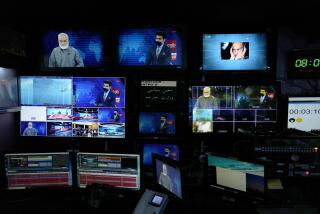Yeltsin Prohibits Ads for Alcohol and Tobacco : Russia: Decree limits marketing of objectionable products in mass media. Critics say it will curtail journalistic independence.
- Share via
MOSCOW — The Marlboro Man is now persona non grata in Russia.
Effective Wednesday, a decree by President Boris N. Yeltsin prohibits all mass media advertising of tobacco, alcohol, psychic healers and untested drugs and medical “cures.”
The ban was immediately denounced as censorship by Russia’s newspapers, magazines and television networks, which reap a large share of their revenues from the glamorous ads for American cigarettes and imported liquor that have flooded this country since the collapse of the Soviet Union.
Some also see it as a heavy-handed attempt by Yeltsin to bring feisty and independent television broadcasters to heel by cutting a major source of their income.
The government has been deeply damaged by televised coverage of the bloody war in Chechnya, and Yeltsin expressed increasing frustration with the media in his address to Parliament last week.
Nevertheless, the ban is likely to be popular with the many Russians who resent the onslaught of commercials for foreign-made poisons.
The Russian Ministry of Health welcomed Yeltsin’s decree. Medical authorities cite rising alcohol consumption as a major contributor to Russia’s worsening public health. Death by alcohol poisoning is up sharply; alcohol and tobacco are held partly to blame for the decline in Russian life expectancy.
Seductive Western-style advertising is seen as powerful temptation for young people to take up smoking. On Moscow’s streets, children as young as 8 can be seen puffing away.
Alcohol may not be sold to those younger than 18, or within 500 yards of schools, kindergartens or factories. But these rules are routinely ignored, said Alexander N. Pintelin, a lawyer with the State Alcohol Inspectorate.
These days, Russian TV ads are often wilder and more entertaining than the programs. Besides ads for cigarettes and alcohol, there are spots pushing diet pills, impotence cures, faith healers, fortunetellers and all kinds of dubious get-rich-quick schemes.
Bilked investors have been especially vocal in demanding government protection against consumer fraud and misleading advertising since the collapse of the MMM investment fund last summer.
But even some who favor stricter controls faulted Yeltsin for deciding the complex issue by fiat days before the 13-month-old Parliament was expected to vote on regulating such advertising.
Foes also accused Yeltsin, who has been known to take a drink and is reported to have frequented a psychic, of hypocrisy.
“When Yeltsin, of all people, talks about the harm of libations it makes one think,” said a sarcastic Moskovsky Komsomolets newspaper.
Does the president intend “a war against drinking or a war against the press, which has so irritated his entourage since the beginning of the Chechnya campaign, and for whom the revenues from the rich Western producers of high-quality poison are often the only possible way to stay afloat?” the newspaper asked.
Critics also said this ban will do no more to change Russian smoking and drinking habits than the innumerable failed Soviet-era campaigns.
“If the president thinks this measure will protect public health, he is grossly mistaken,” said Galina A. Grishayeva of Video Art Co., a television advertising agency. “People always drank all kinds of filth, sometimes poison, they smoked horrible tobacco, and they will continue to do so. At least what we advertised on TV were high-quality products.”
The Russian Parliament is scheduled to take up the question Friday. It could either support Yeltsin’s outright ban or place limits on when, where and how alcohol and tobacco can be promoted.
Yeltsin’s decree says unlawful advertisers’ profits will be confiscated and used to fund health care.
But several legal experts said the document is so loosely worded that it is probably unenforceable.
A series of similarly vague Soviet-era strictures, as well as more recent laws and government decrees, remain on the books, but they have never been complied with.
This one may be ignored too. Wednesday, the NTV independent television network ran ads for Kent and Lucky Strike cigarettes; state-owned All-Russian Television ran ads for two European brands of cigarettes.
The decree does not define what makes up “the mass media.” Are billboards and bus signs included? It doesn’t say.
“It’s a return to censorship, a return to having people whose names you don’t even know make such decisions without discussion,” complained Bruce Macdonald, general director of BBDO Marketing in Moscow.
He warned that the ban could throw a damper on the growing investment by Western tobacco companies here.
Then, summing up the confusion and frustration of many Westerners trying to do business in Russia, Macdonald added: “We will try to follow the law--as soon as we understand the law, and which law is the law.”
More to Read
Sign up for Essential California
The most important California stories and recommendations in your inbox every morning.
You may occasionally receive promotional content from the Los Angeles Times.













